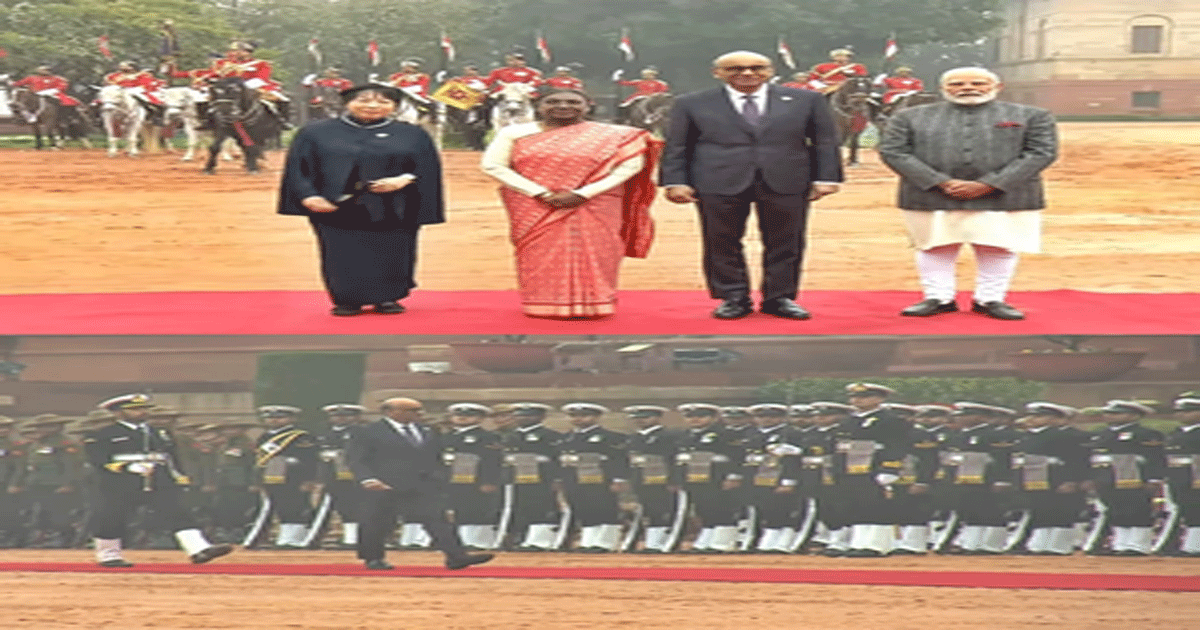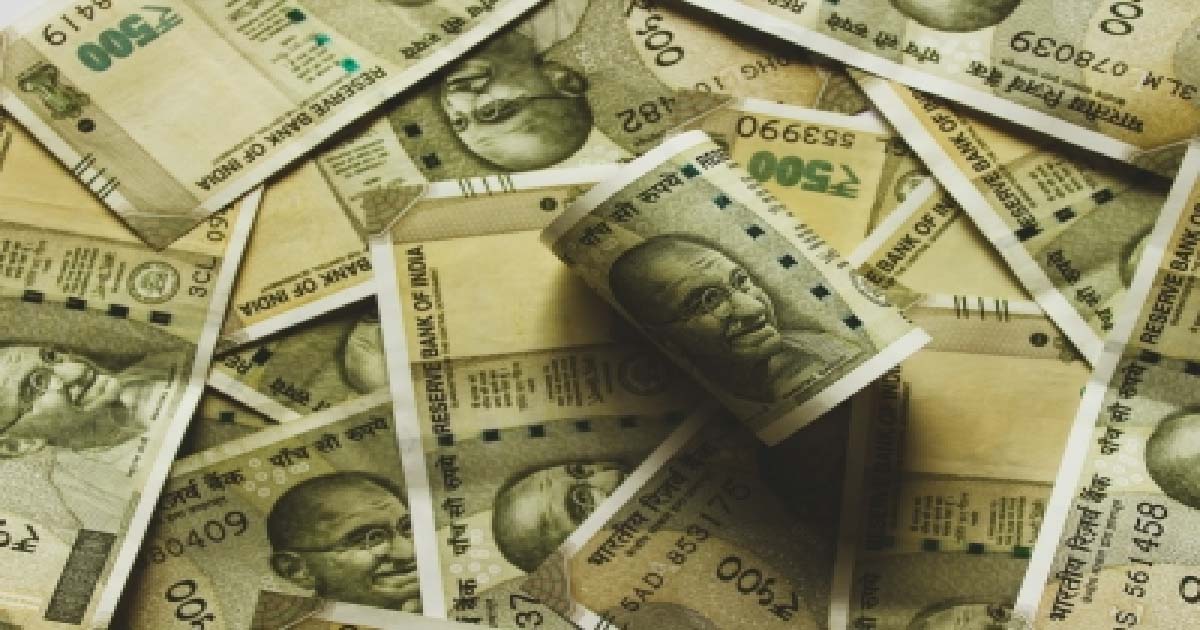International News
Singapore is invested in India’s ambition of Viksit Bharat, says President Shanmugaratnam on his state visit

New Delhi, Jan 16: Singapore President Tharman Shanmugaratnam was given a ceremonial welcome at the Rashtrapati Bhavan on Thursday by President Droupadi Murmu and Prime Minister Narendra Modi, marking the beginning of his State Visit to India.
This visit, his first as President of Singapore, coincides with the 60th anniversary of diplomatic relations between the two nations.
Speaking to the reporters following his ceremonial welcome, the Singapore President said, “We will never forget that India was one of the first few countries to recognise Singapore’s independence in 1965, and since then, our relationship has grown by bounce. It is a natural partnership between small country Singapore and large country India, but we find ways to cooperate in our mutual interests.”
Stressing the bilateral ties between the two nations, he mentioned that Singapore is the largest investor in India, and the defence ties between the two nations are also strong, continuing to grow further.
“We are now on a new trajectory with India with the upgrade of our relations to a comprehensive strategic partnership, which was announced during Prime Minister Modi’s visit to Singapore in September last year. We are exploring new initiatives going beyond the existing very active relationship that we have. We are working on cooperating in advanced manufacturing and semiconductors, new generation and net zero industrial parks, as well as on the skilling of the new industries that are involved,” he mentioned.
Stating the Indian and Singapore leaders “see eye-to-eye,” Shanmugaratnam also stated that both countries are working together in the field of digitalisation and sustainability.
“Singapore is invested in India’s ambition to be a developed country –Viksit Bharat 2047,” he added.
Tharman arrived in New Delhi on Tuesday evening and engaged in high-level discussions on Wednesday.
External Affairs Minister S. Jaishankar met the visiting President to discuss key areas of bilateral cooperation, including semiconductors, industrial parks, skilling, digitalisation, and trade development.
“Delighted to call on President Tharman Shanmugaratnam of Singapore today. Discussed our cooperation in semiconductors, industrial parks, skilling, digitalisation, and trade development. Confident that his State visit will add new momentum to our comprehensive strategic partnership,” Jaishankar shared on X after the meeting.
Accompanied by a high-level delegation of ministers, parliament members, and officials, the Singapore President is scheduled to hold bilateral meetings with President Murmu and Prime Minister Modi later in the day. Following his engagements in New Delhi, he will visit Odisha on January 17-18.
The Ministry of External Affairs highlighted the robust relationship between the two countries, emphasising that it is rooted in friendship, trust, and mutual respect. The ties were elevated to a Comprehensive Strategic Partnership during Prime Minister Modi’s visit to Singapore in September 2024.
Prime Minister Modi had previously acknowledged the strength of bilateral cooperation in various sectors during his visit to Singapore. He noted the potential for further collaboration, particularly in areas like social and digital investments and India’s emergence as a leading global growth centre.
President Tharman’s visit is expected to strengthen the Comprehensive Strategic Partnership, fostering deeper collaboration in key areas of mutual interest.
Crime
Intelligence alert: Pak-backed D-company gears up to push in fake notes worth crores before polls in India

New Delhi, Jan 27: With back to back elections set to be held in India this year, Intelligence agencies have warned that the fake currency racket is bound to increase. The Dawood Syndicate which controls this racket from Pakistan, has increased printing of fake notes and the same is being moved to Bangladesh and Nepal.
An Intelligence Bureau official said that they have noticed heightened activity in Malda, West Bengal which is the main landing point for fake currency from the neighbouring country. Those running the racket in Malda have been preparing to receive a massive consignment from Bangladesh, the official added.
Another official said that the Dawood Syndicate will also look to move fake currency through the Nepal border and hence there is a heightened alert. These elements are trying to take advantage of the fact that the security mechanism will be more focussed on the elections and hence they would be able to get away with their nefarious activities.
Officials say that it is important that this menace is controlled at the border itself. Once the fake currency enters the country it is next to impossible to detect, the official added.
The Intelligence agencies who work closely with the forensics department have learnt that the notes are of very high quality and forensic experts believe that the notes are printed on highly sophisticated machines. The Pakistan establishment has invested huge capital to ensure that these notes cannot be detected by the Indian agencies.
Officials say that the fake currency has the perfect watermark formulation. This indicates that the notes are printed on regular currency making machines, which can be owned only by a state.
Intelligence agencies have learnt that fake currency notes to the tune of crores of Rupees were moved into Bangladesh. Most of the fake notes were dropped off using the sea route, the agencies have learnt. The D Syndicate finds this route easier today as there are no checks for Pakistan, thanks to Dhaka’s new soft policy towards Islamabad.
Under Muhammad Yunus the sea route was opened up to Pakistan for the first time. Indian agencies suspect that huge consignments of arms and ammunition have reached Bangladesh using the sea route. The same route is also being used to push the fake currency into Bangladesh.
The challenge would however be to bring it into India. The D Company will try to use both the Nepal and Bangladesh border to smuggle in the fake currency, officials say. While the consignment that comes in from Nepal would be taken to Bihar, the fake notes at the Bangladesh border will be moved into Malda.
From here the notes would be distributed to other parts of the country. Another official added that once the notes land in India, the target states would be the ones where elections are scheduled to be held.
Elections are due in Assam, West Bengal, Tamil Nadu, Kerala and Puducherry. The polls are scheduled to be held between March and May 2026. Officials say that the D gang would try and move most of the fake notes into these states since the security agencies would be too busy with the elections.
The agencies are keeping a close watch on the border areas. The alert is high in Malda and the neighbouring areas, as the Intelligence agencies say that the biggest consignment would land in these places.
International News
PM Modi welcomes UAE President at airport, hails strong friendship between both nations

New Delhi, Jan 19: In a special gesture, Prime Minister Narendra Modi on Monday travelled to the Delhi airport and personally welcomed UAE President Shaikh Mohamed bin Zayed Al Nahyan as he began his third official visit to the country since assuming office.
Both leaders also travelled together in the same car from the airport, showcasing their longstanding friendship and the multi-faceted partnership between the two countries. This is the UAE President’s fifth visit to India over the past decade.
“Went to the airport to welcome my brother, His Highness Shaikh Mohamed bin Zayed Al Nahyan, President of the UAE. His visit illustrates the importance he attaches to a strong India-UAE friendship. Looking forward to our discussions,” PM Modi posted on X.
Shaikh Mohamed bin Zayed Al Nahyan’s India visit builds on the strong momentum generated by recent high-level exchanges, including the visit of Shaikh Khaled bin Mohamed bin Zayed Al Nahyan, Crown Prince of Abu Dhabi in September 2024, and the visit of Shaikh Hamdan bin Mohammed bin Rashid Al Maktoum, Deputy Prime Minister and Minister of Defence of the UAE and Crown Prince of Dubai in April 2025.
“India and the UAE share warm, close, and multi-faceted relations, underpinned by strong political, cultural, and economic ties. The two countries are among each other’s top trading and investment partners, bolstered by the Comprehensive Economic Partnership Agreement (CEPA), the Local Currency Settlement (LCS) system, and the Bilateral Investment Treaty. India and the UAE also enjoy a robust energy partnership, including long-term energy supply arrangements,” read a statement issued by the Ministry of External Affairs (MEA) ahead of the UAE President’s visit.
“The visit will provide an opportunity for the two leaders to chart new frontiers for the India–UAE Comprehensive Strategic Partnership. It will also enable an exchange of views on regional and global issues of mutual interest, where India and the UAE share a high degree of convergence,” it added.
International News
Trump says US reshaped global dynamics

Washington, Jan 17: President Donald Trump said that his administration had reshaped global dynamics through assertive diplomacy and military action, laying out an expansive account of US foreign policy and economic gains during remarks at a Florida event.
Trump said US actions abroad had produced swift and decisive outcomes. “We have peace in the Middle East. Nobody thought that was going to be possible,” he said, pointing to what he described as multiple agreements reached within a year.
He also claimed “US intervention” helped avert conflict between two nuclear nations — India and Pakistan, and said the effort saved “many millions of people.”
Trump said Iran’s nuclear ambitions had been dismantled, declaring that the United States had “obliterated Iran’s nuclear enrichment capacity with Operation Midnight Hammer.” He also cited operations against militant leaders, including the founder of ISIS and Iranian General Qassem Soleimani, arguing that decisive military action had strengthened US security and deterrence.
Trump said the United States had apprehended Venezuelan President Nicolas Maduro, describing him as an “outlaw” and asserting that “no other nation in the world could have done” what the United States achieved. He said the move was part of a broader effort to reset relations and relieve regional pressures.
The president said the United States had attracted unprecedented levels of foreign investment. “We have $18 trillion being invested,” he said, adding that the total could rise further.
He credited tax cuts, regulatory rollbacks and tariffs for driving growth and said manufacturing activity was expanding at historic levels. “We’re building more factories in the United States now than at any time in our history,” he said, citing both automotive and advanced technology sectors.
Trump said tariffs played a central role in pushing companies to shift production to the United States. “They don’t want to pay the tariffs,” he said, calling it a “pretty simple formula.” He also pointed to stock market performance and retirement savings, saying 401(k) accounts were “doing better than they’ve ever done before.”
On immigration, Trump said his administration had fully secured the southern border, describing illegal crossings as an “invasion” that had been halted. He said enforcement efforts focused on violent criminals and gangs, while legal immigration continued through established processes.
-

 Crime3 years ago
Crime3 years agoClass 10 student jumps to death in Jaipur
-

 Maharashtra1 year ago
Maharashtra1 year agoMumbai Local Train Update: Central Railway’s New Timetable Comes Into Effect; Check Full List Of Revised Timings & Stations
-

 Maharashtra1 year ago
Maharashtra1 year agoMumbai To Go Toll-Free Tonight! Maharashtra Govt Announces Complete Toll Waiver For Light Motor Vehicles At All 5 Entry Points Of City
-

 Maharashtra1 year ago
Maharashtra1 year agoFalse photo of Imtiaz Jaleel’s rally, exposing the fooling conspiracy
-

 National News1 year ago
National News1 year agoMinistry of Railways rolls out Special Drive 4.0 with focus on digitisation, cleanliness, inclusiveness and grievance redressal
-

 Maharashtra1 year ago
Maharashtra1 year agoMaharashtra Elections 2024: Mumbai Metro & BEST Services Extended Till Midnight On Voting Day
-

 National News1 year ago
National News1 year agoJ&K: 4 Jawans Killed, 28 Injured After Bus Carrying BSF Personnel For Poll Duty Falls Into Gorge In Budgam; Terrifying Visuals Surface
-

 Crime1 year ago
Crime1 year agoBaba Siddique Murder: Mumbai Police Unable To Get Lawrence Bishnoi Custody Due To Home Ministry Order, Says Report












